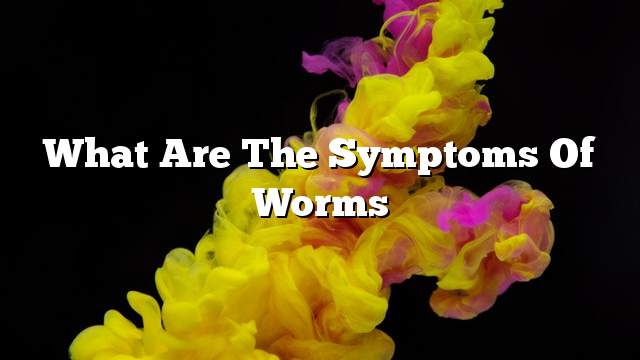Worms
The animal kingdom contains various types of worms (Worms) that reach thousands of species. These worms live in multiple environments such as land, water, and some species living within human beings. They are called Parasites, Parasites are their food from the host organism in which they live, causing various symptoms and health conditions ranging in severity from moderate to severe.
Types of intestinal worms and ways of spread
Types of worms that may cause infection include:
- Tapeworm: Tapeworms can be infected by the consumption of water contaminated with the eggs of these worms or larvae, and these worms can be transmitted to the human by eating the meat is not cooked well, it is worth mentioning that these worms implant their head in the wall of the intestine, and produce eggs that can be transmitted to Other parts of the body.
- Flukes: This type of worm affects animals more than humans, but can be transmitted to humans through contaminated water, or by eating uncooked watercress or other aquatic plants.
- Hookworms: This type of roundworm is transmitted through contaminated waste and soil. It occurs when a barefoot person walks on contaminated soil with its larvae. These larvae penetrate and puncture the skin. This type of worm lives in the small intestine. These worms anchor themselves in the intestines with their own hooks, usually less than 1.27 cm in length.
- Pinworms: Also known as Threadworms, a type of cylindrical worm, is relatively harmless. These worms live in the colon and rectum, and female worms place eggs around the anus during the period. Usually night, these worms live on clothes, blood, and some substances. The human is infected only if he touches the eggs and moved to his mouth one way or another. These worms are transmitted frequently among children, in associations and institutions as caregivers, and can be transmitted by breathing when carried in the air as small.
- Trichinosis Worms: This type of worm is transmitted through animals, and is usually infected by eating raw meat that is contaminated with eggs. These eggs ripen inside the human intestines and when they multiply, the new eggs migrate to places outside the intestine, such as muscles. ), And different tissues.
Symptoms of worms
General symptoms of worms
There may be no symptoms on the person who is infected, or may be very simple symptoms, as well as does not require the emergence of worms and see the eye, and symptoms that may appear as follows:
- Nausea.
- Loss of Appetite.
- Diarrhea (Diarrhea).
- Abdominal pain.
- Weight Loss.
- Feeling general weakness in the body (General Weakness).
Symptoms characterized by some types of worms
Worms can cause the following symptoms in addition to general symptoms of worms:
- Lumps or bumps.
- Allergic reaction (Allergic Reaction).
- Bacterial Infection.
- Fever.
- Neurological problems such as spasms.
Perforated worms also cause some additional symptoms, although these symptoms may take weeks to months to develop.
- Fever.
- Feeling tired and tired (Fatigue).
Additional symptoms that can cause hookworms include:
- A rash that causes itching (Itchy Rash).
- Anemia (Anemia).
- Feeling tired and tired (Fatigue).
As for the symptoms caused by capillary worms due to their transmission through blood and entering the tissues of the body and muscles, they are as follows:
- Fever.
- Swelling Of The Face.
- Pain and muscle pain.
- Headache.
- Light Sensitivity.
- Inflammation of the conjunctivitis (Conjunctivitis).
Worm treatment and prevention
Worms can be treated with a single dose of medication. These drugs are often administered over-the-counter. It should be noted that the medicine is not given to the patient alone, but to all members of his family. Because prevention is better than cure,
- Be sure to wash the children’s hands after finishing using the toilet, before eating.
- Accelerate treatment of infected children.
- Changing underwear and bed linen on a daily basis after completion of treatment, and keep this order for several days, it should be noted that the use of hot water in washing clothes and bedding eliminates the eggs of some types of worms.
- Keep the toilet clean periodically.
- Keep cutting and shortening children’s nails.
- In cases of diarrhea, the person is isolated from school or work for 24 hours after diarrhea has stopped, and in the absence of diarrhea, he does not resort to isolation.
